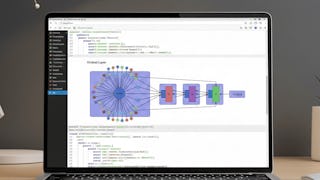Gain hands-on experience in deep learning with Python and learn to design, train, and optimize advanced neural networks for real-world artificial intelligence applications. This course is ideal for data scientists, machine learning engineers, and AI enthusiasts who want to enhance their skills in building intelligent systems using Python.

Enjoy unlimited growth with a year of Coursera Plus for $199 (regularly $399). Save now.

Practical Deep Learning with Python
This course is part of Mastering AI: Neural Nets, Vision System, Speech Recognition Specialization

Instructor: Edureka
Included with
Recommended experience
What you'll learn
Understand the core components of deep learning models and their role in AI.
Apply CNN, R-CNN, and Faster R-CNN for object detection tasks.
Implement RNNs and LSTMs for sequential data processing.
Optimize and evaluate deep learning models for improved performance.
Skills you'll gain
Details to know

Add to your LinkedIn profile
13 assignments
See how employees at top companies are mastering in-demand skills

Build your subject-matter expertise
- Learn new concepts from industry experts
- Gain a foundational understanding of a subject or tool
- Develop job-relevant skills with hands-on projects
- Earn a shareable career certificate

There are 4 modules in this course
In this module, you will explore the fundamental components of deep learning by designing perceptron and implementing their functionality. You will address the limitations of perceptron by utilizing Multi-Layer Perceptron (MLPs) and observe how MLPs significantly enhance model performance.
What's included
25 videos4 readings4 assignments2 discussion prompts
In the second module of this course, learners will learn about the working of Convolutional Neural Networks (CNN) and understand their importance in training deep learning models. Learners will also work on improving CNN model performance using RCNN and Faster RCNN, observe the computation time of these models, and gauge their accuracy score.
What's included
27 videos3 readings4 assignments1 discussion prompt
This module focuses on Recurrent Neural Networks (RNNs) and Long Short-Term Memory (LSTM) networks for sequential data processing. Learners will gain practical skills in building, training, and optimizing models for complex tasks.
What's included
24 videos4 readings4 assignments
This module is designed to assess an individual on the various concepts and teachings covered in this course. Evaluate your knowledge with a comprehensive graded quiz on SLP, MLP, RNN, CNN, LSTM and many more complex deep learning concepts.
What's included
1 video1 reading1 assignment1 discussion prompt
Earn a career certificate
Add this credential to your LinkedIn profile, resume, or CV. Share it on social media and in your performance review.
Explore more from Machine Learning
 Status: Free Trial
Status: Free Trial Status: Free Trial
Status: Free Trial Status: Free Trial
Status: Free Trial
Why people choose Coursera for their career




Frequently asked questions
Deep learning is a subset of machine learning that emphasizes artificial neural network algorithms designed to mimic the structure and functions of the human brain. Multi-layered neural networks are developed to autonomously learn and identify features from vast datasets, enabling them to effectively perform tasks such as speech recognition, image recognition, and natural language processing. Deep learning plays a crucial role in AI advancements as it requires extensive amounts of data and computational strength.
The target audience for Practical Deep Learning with Python comprises beginners and intermediate learners eager to grasp and utilize deep learning methods with Python. This course is tailored for for data scientists, AI Research Analysts, and developers who possess fundamental programming skills and a basic grasp of machine learning principles.
To effectively follow the exercises and examples in Practical Deep Learning with Python, you will need a computer with the following minimum system requirements:
- Operating System: Windows, macOS, or Linux.
- Processor: A multi-core processor (preferably with support for AVX instructions).
- RAM: At least 8 GB of RAM, though 16 GB or more is recommended for larger datasets.
- Storage: At least 10 GB of free disk space to accommodate datasets, libraries, and project files.
- Python Environment: Python 3.6 or later installed with libraries such as TensorFlow or PyTorch, NumPy, Matplotlib, and Pandas.
Please note: All the practical are performed on Google Colab
More questions
Financial aid available,






